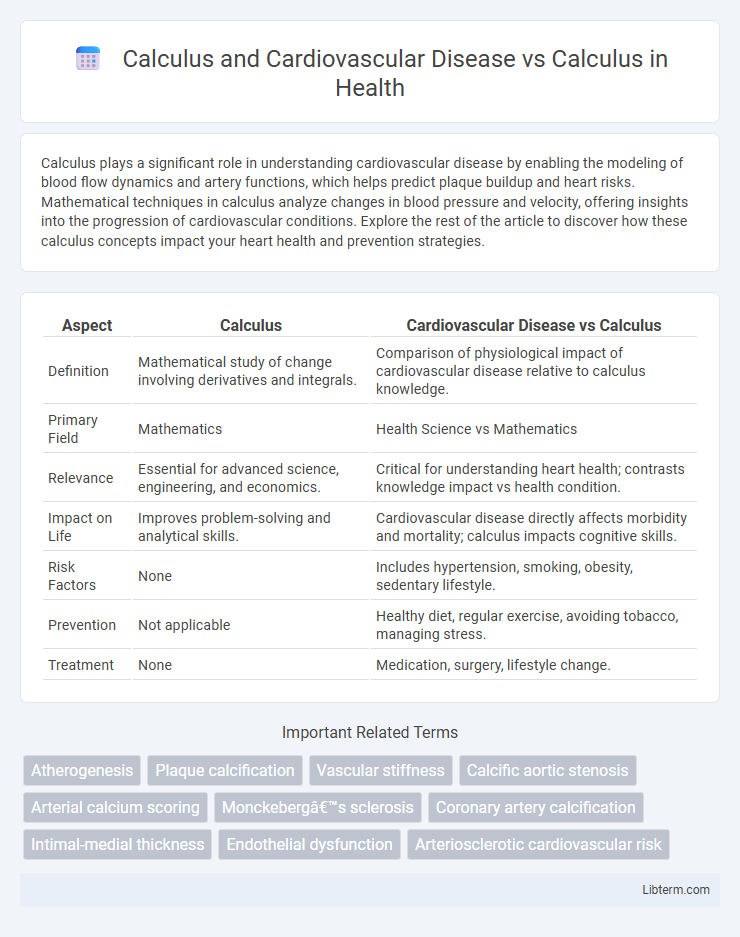Calculus plays a significant role in understanding cardiovascular disease by enabling the modeling of blood flow dynamics and artery functions, which helps predict plaque buildup and heart risks. Mathematical techniques in calculus analyze changes in blood pressure and velocity, offering insights into the progression of cardiovascular conditions. Explore the rest of the article to discover how these calculus concepts impact your heart health and prevention strategies.
Table of Comparison
| Aspect | Calculus | Cardiovascular Disease vs Calculus |
|---|---|---|
| Definition | Mathematical study of change involving derivatives and integrals. | Comparison of physiological impact of cardiovascular disease relative to calculus knowledge. |
| Primary Field | Mathematics | Health Science vs Mathematics |
| Relevance | Essential for advanced science, engineering, and economics. | Critical for understanding heart health; contrasts knowledge impact vs health condition. |
| Impact on Life | Improves problem-solving and analytical skills. | Cardiovascular disease directly affects morbidity and mortality; calculus impacts cognitive skills. |
| Risk Factors | None | Includes hypertension, smoking, obesity, sedentary lifestyle. |
| Prevention | Not applicable | Healthy diet, regular exercise, avoiding tobacco, managing stress. |
| Treatment | None | Medication, surgery, lifestyle change. |
Understanding Calculus: Mathematical Concepts and Applications
Calculus, a fundamental branch of mathematics, involves the study of limits, derivatives, integrals, and infinite series, providing essential tools for modeling dynamic systems and continuous change. In cardiovascular disease research, calculus enables precise modeling of blood flow dynamics, pressure changes, and the progression of arterial plaque, facilitating improved diagnostic and therapeutic strategies. Understanding these mathematical principles is crucial for biomedical engineers and healthcare professionals aiming to analyze complex physiological processes and develop innovative cardiovascular treatments.
The Role of Calculus in Modern Medicine
Calculus plays a crucial role in modern medicine by enabling precise modeling of cardiovascular dynamics, such as blood flow and heart function, which helps predict and manage cardiovascular disease effectively. Mathematical techniques in differential calculus analyze rates of change in physiological parameters, facilitating early diagnosis and treatment strategies. The integration of calculus into biomedical engineering advances the design of medical devices, optimizing patient outcomes and accelerating innovations in cardiovascular care.
Cardiovascular Disease: Causes, Symptoms, and Impact
Cardiovascular disease (CVD) encompasses a range of heart and blood vessel disorders caused primarily by atherosclerosis, hypertension, and lifestyle factors such as smoking, poor diet, and sedentary behavior. Symptoms vary widely, including chest pain, shortness of breath, fatigue, and in severe cases, heart attacks or strokes, significantly impacting patient quality of life and healthcare costs globally. Effective management relies on early diagnosis, lifestyle modification, and medical intervention to reduce morbidity and mortality associated with cardiovascular conditions.
Mathematical Modeling of Cardiovascular Disease
Mathematical modeling of cardiovascular disease leverages calculus to simulate blood flow dynamics, arterial pressure, and heart function, enabling precise predictions of disease progression and treatment outcomes. Differential equations describe the interaction between blood vessels and hemodynamic forces, while integral calculus quantifies the accumulation of plaque and damage over time. This approach enhances the understanding of complex physiological processes, facilitating the development of personalized medical interventions and improving cardiovascular risk assessment.
Comparing Medical Terminology: “Calculus” as a Disease vs. Mathematics
Calculus in medical terminology refers to hardened mineral deposits like kidney or gallstones, often associated with cardiovascular disease when arterial plaques form, causing blockages. In contrast, calculus in mathematics involves the study of limits, derivatives, and integrals, essential for analyzing change and motion. Understanding these distinct definitions highlights how identical terms acquire specialized meanings in biomedical and mathematical contexts.
Calculus in Predicting Cardiovascular Disease Progression
Calculus, a branch of mathematics focused on rates of change and accumulation, plays a crucial role in modeling cardiovascular disease progression by quantifying dynamic changes in blood flow and arterial plaque buildup. Advanced differential equations and integral calculus enable precise simulations of hemodynamic factors, aiding in early prediction and risk assessment of cardiovascular events. Computational models leveraging calculus enhance the accuracy of diagnostic tools and personalized treatment strategies for cardiovascular disease management.
Data Analysis in Cardiovascular Research Using Calculus
Calculus plays a critical role in cardiovascular research by enabling precise modeling of blood flow dynamics and heart function through differential equations and integrals. Data analysis in cardiovascular research leverages calculus-based techniques to quantify rates of change in physiological variables, such as blood pressure and heart rate variability, improving prediction accuracy for cardiovascular diseases. Advanced computational algorithms using calculus optimize the interpretation of large datasets, facilitating early diagnosis and personalized treatment strategies for cardiovascular conditions.
Preventative Measures in Cardiovascular Care: Insights from Calculus
Calculus provides critical tools for modeling blood flow dynamics and predicting plaque buildup in cardiovascular arteries, enabling early detection of disease risk. Preventative measures such as optimizing blood pressure and cholesterol levels benefit from calculus-based simulations that assess the impact of lifestyle changes on cardiovascular health. Leveraging calculus in cardiovascular care supports personalized intervention strategies, improving outcomes by anticipating disease progression.
Challenges and Limitations of Calculus in Cardiovascular Studies
Calculus application in cardiovascular studies faces challenges including modeling the complex hemodynamics of blood flow and accounting for the non-Newtonian properties of blood, which complicate differential equation solutions. Limitations arise from assumptions of linearity and ideal fluid behavior, potentially reducing the accuracy of predictions in arterial dynamics and plaque formation. Computational constraints and the need for high-resolution, patient-specific data further hinder the precise application of calculus in understanding cardiovascular disease progression.
Future Directions: Integrating Advanced Calculus with Cardiovascular Disease Research
Future directions in cardiovascular disease research emphasize integrating advanced calculus techniques, such as partial differential equations and multivariable calculus, to model complex hemodynamic processes and predict disease progression. Mathematical modeling powered by calculus enables more accurate simulations of blood flow dynamics and arterial plaque development, facilitating personalized treatment planning. Emerging computational methods combining calculus with machine learning hold promise for revolutionizing diagnostics and therapeutic interventions in cardiovascular medicine.
Calculus and Cardiovascular Disease Infographic

 libterm.com
libterm.com